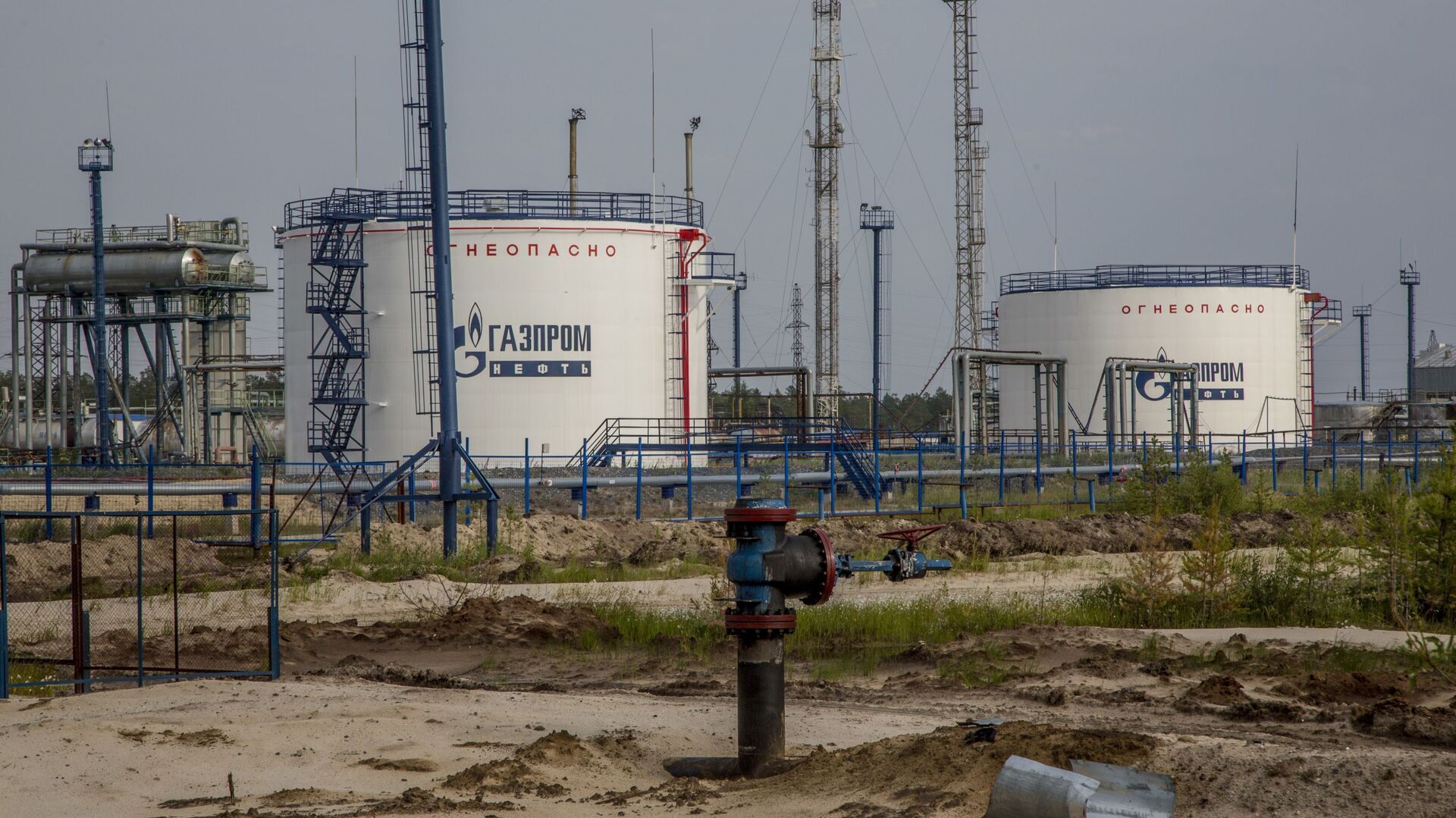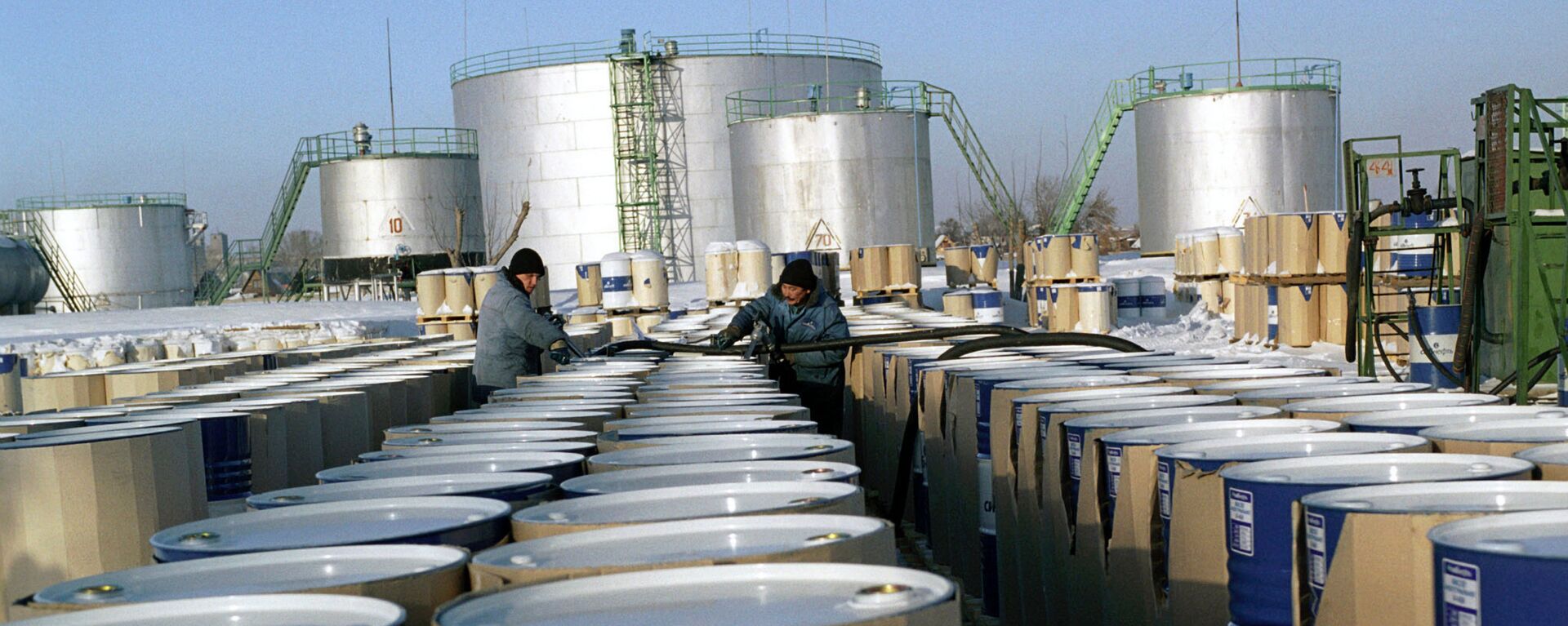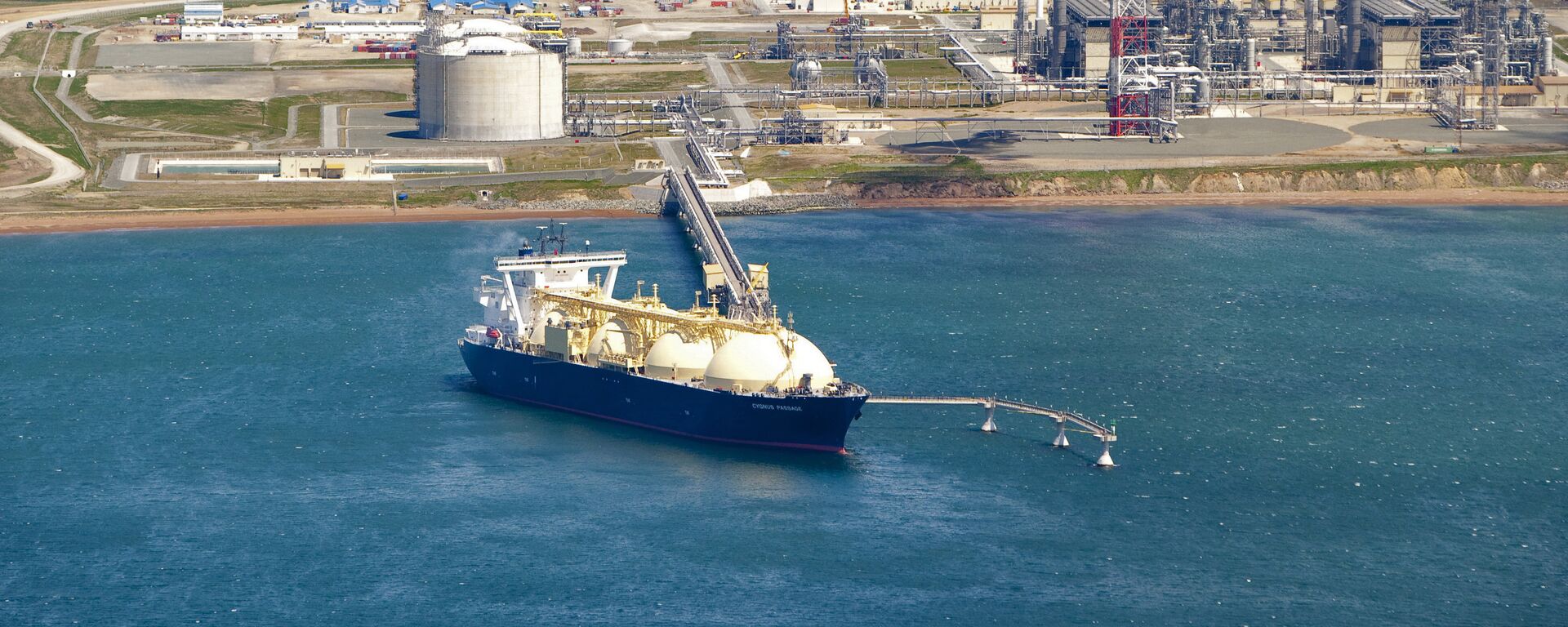https://sputnikglobe.com/20220712/russian-oil-price-cap-fraught-with-technical--diplomatic-challenges-us-treasury-concedes-1097213356.html
Russian Oil Price Cap Fraught With ‘Technical, Diplomatic Challenges', US Treasury Concedes
Russian Oil Price Cap Fraught With ‘Technical, Diplomatic Challenges', US Treasury Concedes
Sputnik International
At their summit in June, the G7 leaders agreed to explore the feasibility of price caps on imports of Russian energy. They touted the measure as a way to... 12.07.2022, Sputnik International
2022-07-12T07:48+0000
2022-07-12T07:48+0000
2022-11-15T14:22+0000
russia's special operation in ukraine
russia
ukraine crisis
janet yellen
g7 summit
energy prices
oil
https://cdn1.img.sputnikglobe.com/img/07e5/02/11/1082102602_0:161:3071:1888_1920x0_80_0_0_2e570b100801820982a8880d2099dfa8.jpg
Capping the price of Russian oil exports could prevent the global costs of a barrel surging by 40 percent to reach about $140 a barrel, a senior US Treasury official has told reporters in Tokyo.Oil prices rose above $120 a barrel in June, and are presently at around $103 a barrel.The idea of imposing a price cap on Russian oil has been gaining traction since the measure was discussed by the United States and its partners during the Group of Seven (G7) meeting in Germany between 28 and 30 June.Now, Treasury Secretary Janet Yellen has embarked on what has been dubbed a “lobbying” tour to the Indo-Pacific region for the proposal she vowed could stave off a global recession.Yellen’s 10-day trip will see her visit Japan, South Korea and also attend a gathering of finance ministers from the G20 countries in Bali on 15 to 16 July.A substantial importer of Russian energy, Japan has so far not backed the price-cap plan, which Yellen has been championing.Yellen will lay out the “benefits” of the price cap proposal in a meeting with Japanese Finance Minister Shun'ichi Suzuki on Tuesday, the unnamed Treasury official was cited by Reuters as saying. He added that Tokyo will probably hold out for assurances that the mulled price cap would not be set too low. Previously, Japanese officials reportedly had not rejected a potential price range of $40 to $60 per barrel, the official said.‘Technical & Diplomatic Challenges’Washington has been insisting that capping the oil price would not only bring energy prices down, but also punish Russia for its special operation in Ukraine by limiting the revenue it derives from the sales. However, there is a growing fear that this could remove Russia’s incentive to continue with exports.At the heart of the conceived plan is the idea that the price could be set at a level that would cover Russia's marginal cost of production, the Treasury official explained. This approach would leave Moscow incentivized to continue exporting oil, while slashing the Kremlin’s revenues.The US and leaders of the Group of Seven (G7) countries - Britain, Canada, Germany, France, Italy and Japan, along with the European Union - have agreed to explore imposing the cap, but have been foggy on the details of the plan’s implementation.Questions remain regarding how to enforce such a plan, deciding the optimum sales price, as well as convincing other nations to subscribe to it.A section of the final G7 communique after the summit in the Bavarian Alps on 28 to 30 June stated that an oil price cap set at $40 to $60 could be implemented through options such as allowing Russian seaborne crude oil and petroleum products to be shipped globally under the condition they are purchased at or below an agreed price threshold.The European Union previously imposed numerous sanctions hitting Russia's banking, financial and media organizations, government officials and lawmakers, as well as oil supplied by sea, among other restrictions. Furthermore, several European leaders called on Brussels to include a ban on Russian gas in a future sanctions package. However, banning Russian imports has exacerbated a supply crunch and driven up prices.With the EU preparing for a phased embargo on Russian oil and a ban on maritime insurance for any tanker carrying it, Janet Yellen has been touting the price cap as a way to maintain critical oil flows.‘Price Exception’ ScenarioImplementing the EU’s insurance and reinsurance ban - part of the sixth set of economic sanctions aimed at Russia and covering all maritime transportation of its oil without a “price exception” could trigger significant increases in the price of crude oil, warned the US Treasury official.Accordingly, Washington has reportedly proposed a "price exception" that would rescind that maritime insurance ban in cases when orders are below the agreed price. The Treasury hopes that this will prevent millions of barrels of Russian oil from being taken out of flow because of a lack of insurance once the ban takes effect at the end of this year, said the US official.EU, British and US firms account for about 90 percent of global oil shipping insurance and reinsurance.The official weighed in on the speculation that Russia, India and China could propose sovereign insurance to circumvent the ban, saying US Treasury officials did not share that view.This comes as surging crude oil and fuel prices boosted Russian revenues in May despite the sanctions, the International Energy Agency said."With higher crude oil and product prices globally, Russian oil export revenues are estimated to have increased by $1.7Bln in May to about $20Bln," the agency stated in its monthly oil report.China's imports of Russian oil and fuel topped 2Mln bpd in May, the agency added, with India taking Germany's place as the number two destination for Russian shipments.During her earlier trip to Europe in May, Yellen acknowledged the hardships linked with implementing the price cap.
https://sputnikglobe.com/20220712/us-state-department-biden-g7-leaders-actively-exploring-imposing-price-cap-on-russian-oil-1097208107.html
https://sputnikglobe.com/20220630/g7-idea-of-capping-russian-oil-price-will-not-work-for-lack-of-authority-on-market-prof-says-1096842598.html
https://sputnikglobe.com/20220616/us-fears-hike-in-oil-prices-if-eu-and-uk-ban-insuring-tankers-with-russian-oil-reports-suggest-1096374699.html
Sputnik International
feedback@sputniknews.com
+74956456601
MIA „Rosiya Segodnya“
2022
News
en_EN
Sputnik International
feedback@sputniknews.com
+74956456601
MIA „Rosiya Segodnya“
Sputnik International
feedback@sputniknews.com
+74956456601
MIA „Rosiya Segodnya“
ukraine crisis, janet yellen, g7 summit, energy prices, oil
ukraine crisis, janet yellen, g7 summit, energy prices, oil
Russian Oil Price Cap Fraught With ‘Technical, Diplomatic Challenges', US Treasury Concedes
07:48 GMT 12.07.2022 (Updated: 14:22 GMT 15.11.2022) At their summit in June, the G7 leaders agreed to explore the feasibility of price caps on imports of Russian energy. They touted the measure as a way to prevent Moscow from profiting from soaring oil and gas prices that have been driven, in part, by numerous sanctions imposed against Russia over its special military operation in Ukraine.
Capping the
price of Russian oil exports could prevent the global costs of a barrel surging by 40 percent to reach about $140 a barrel, a senior US Treasury official has told reporters in Tokyo.
Oil prices rose above $120 a barrel in June, and are presently at around $103 a barrel.
The idea of imposing a price cap on Russian oil has been gaining traction since the measure was discussed by the United States and its partners during the Group of Seven (G7) meeting in Germany between 28 and 30 June.
Now, Treasury Secretary Janet Yellen has embarked on what has been dubbed a “lobbying” tour to the Indo-Pacific region for the proposal she vowed could stave off a global recession.
Yellen’s 10-day trip will see her visit Japan, South Korea and also attend a gathering of finance ministers from the G20 countries in Bali on 15 to 16 July.
A substantial importer of Russian energy, Japan has so far not backed the price-cap plan, which Yellen has been championing.
Yellen will lay out the “benefits” of the price cap proposal in a meeting with Japanese Finance Minister Shun'ichi Suzuki on Tuesday, the unnamed Treasury official was cited by Reuters as saying. He added that Tokyo will probably hold out for assurances that the mulled price cap would not be set too low.
Previously, Japanese officials reportedly had not rejected a potential price range of $40 to $60 per barrel, the official said.
‘Technical & Diplomatic Challenges’
Washington has been insisting that capping the oil price would not only bring energy prices down, but also punish Russia for its special operation in Ukraine by limiting the revenue it derives from the sales. However, there is a growing fear that this could remove Russia’s incentive to continue with exports.
At the heart of the conceived plan is the idea that the price could be set at a level that would cover Russia's marginal cost of production, the Treasury official explained. This approach would leave Moscow incentivized to continue exporting oil, while slashing the Kremlin’s revenues.
The US and leaders of the Group of Seven (G7) countries - Britain, Canada, Germany, France, Italy and Japan, along with the European Union - have agreed to explore imposing the cap, but have been foggy on the details of the plan’s implementation.
Questions remain regarding how to enforce such a plan, deciding the optimum sales price, as well as convincing other nations to subscribe to it.
A section of the final G7 communique after the summit in the Bavarian Alps on 28 to 30 June stated that an oil price cap set at $40 to $60 could be implemented through options such as allowing Russian seaborne crude oil and petroleum products to be shipped globally under the condition they are purchased at or below an agreed price threshold.
The European Union previously imposed numerous sanctions hitting Russia's banking, financial and media organizations, government officials and lawmakers, as well as oil supplied by sea, among other restrictions. Furthermore, several European leaders called on Brussels to include a ban on Russian gas in a future sanctions package. However, banning Russian imports has exacerbated a supply crunch and driven up prices.
With the EU preparing for a phased embargo on Russian oil and a ban on maritime insurance for any tanker carrying it, Janet Yellen has been touting the price cap as a way to maintain critical oil flows.
‘Price Exception’ Scenario
Implementing the EU’s insurance and reinsurance ban - part of the sixth set of economic
sanctions aimed at Russia and covering all maritime transportation of its oil without a “price exception” could trigger significant increases in the price of crude oil, warned the US Treasury official.
Accordingly, Washington has reportedly proposed a "price exception" that would rescind that
maritime insurance ban in cases when orders are below the agreed price. The Treasury hopes that this will prevent millions of barrels of Russian oil from being taken out of flow because of a lack of insurance once the ban takes effect at the end of this year, said the US official.
EU, British and US firms account for about 90 percent of global oil shipping insurance and reinsurance.
The official weighed in on the speculation that Russia, India and China could propose sovereign insurance to circumvent the ban, saying US Treasury officials did not share that view.
This comes as surging crude oil and fuel prices boosted Russian revenues in May despite the sanctions, the International Energy Agency said.
"With higher crude oil and product prices globally, Russian oil export revenues are estimated to have increased by $1.7Bln in May to about $20Bln," the agency stated in its monthly oil report.
China's imports of Russian oil and fuel topped 2Mln bpd in May, the agency added, with India taking Germany's place as the number two destination for Russian shipments.
During her earlier trip to Europe in May, Yellen acknowledged the hardships linked with implementing the price cap.
“Although I think a lot of people, including me, find it appealing from a general economic point of view, actually making it operational is challenging and all those issues have not yet been worked through,” she stated.







